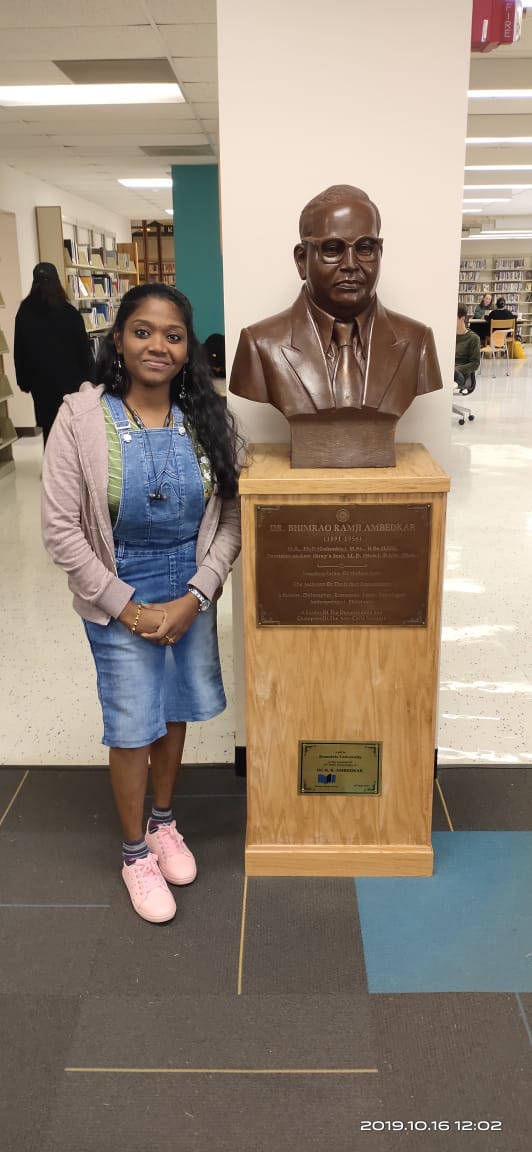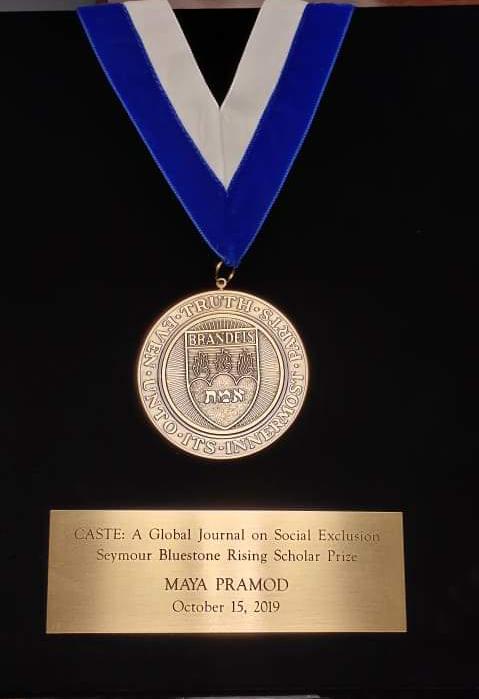‘Land most important for Kerala Dalits’ – Bluestone rising scholar awardee Maya Pramod

By Najiya O, TwoCircles.Net
Maya Pramod, a research scholar who received the prestigious Bluestone Rising Scholar Prize instituted by the Brandeis University, USA, believes ownership of land is the most important factor for Dalits in Kerala.
Pramod was presented with the award at a function held at the University on October 15.
She is presenting four papers in different conferences including the 5th International Conference on the ‘Unfinished Legacy of BR Ambedkar’ from October 24-26 at The New School in New York. Her papers mainly discuss the topics of caste, life in the Dalit caste colonies, Dalit feminism and the issue of land.
Pramod is researching on the socio-economic aspects of the Dalit colony histories in Kerala under the guidance of Dr Sreevidya at the Christ College, Irinjalakkuda. In a conversation with the TwoCircles.Net, she recalled that there have been studies about Dalits and tribals, but not much socially or academically about the Dalit caste colonies in Kerala. “I wanted to study that aspect which is my lived experience too,” said Pramod, who hails from Thrissur district in Kerala. The paper she presented for the Bluestone Rising Scholar Award was titled ‘As a Dalit Woman: My Life in a Caste Ghetto of Kerala’.
She has shared the Prize with Vivek V Narayan who hails from Kerala and is living in Gujarat. Their papers will be published in the ‘CASTE: A Global Journal on Social Exclusion’, the journal of The Heller School for Social Policy and Management at the Brandeis University.
In a country where every achievement of Dalits is seen as a result of reservation, Ms Pramod said she was happy to show the merit in her achievement. “My paper was selected not in India, but from nearly 70 entries from different parts of the world. At the same time, I also understand the responsibility that is upon me now towards my community and the society at large.”
The young researcher has her eyes wide opened towards the condition of Dalit life in Kerala. “There is a general feeling that the Dalits in Kerala are living well off, especially since there is no open violence against them in the state unlike other parts of India. But caste is present mentally and academically in all spheres in the state. The absence of the social capital of land is the most important factor in Kerala.”
[caption id="attachment_433288" align="alignnone" width="479"] The Bluestone Rising Scholar Prize Medal awarded to Maya Pramod[/caption]
The Bluestone Rising Scholar Prize Medal awarded to Maya Pramod[/caption]
She shared her concerns over realising the higher education aspirations of her son in future when she (like most Dalits) don’t own land which makes it impossible to get loans from banks. “Our history is our cultural capital, which is always with us. But where is the social capital called land?” she asks.
In her speeches and writings, Pramod has questioned the project of the Kerala government to give flats to Dalit families. The Dalit families cannot own these tiny flats for 15 years, after which they can own but cannot sell or rent them out. She also points out that these flats are now acting as new Dalit colonies. “Bigshots like the Tata and the Harrison still hold large amounts of land illegally in the state. Only a portion of that would ease the problem of the landless Dalits and tribals. But which government will do that? We don’t want a colony or flats, we want land.”
The young researcher also discusses the topic of Dalit feminism as well as the space of the transgender-queer-LGBT persons within the Dalit community. Her paper on Dalit feminism discusses how a movement uses dressing, jewellery etc as social tools for change citing the example of the women of the Sadhu Jana Paripalana Sangham (SJPS) and the Prathyaksha Raksha Daiva Sabha (PRDS) in Kerala. The SJPS was established in 1907 by social reformer Mahatma Ayyankali for the upliftment of all downtrodden castes, the Dalits.
The women of the SJPS renounced the use of stone necklaces, which was seen as a symbol of their subjugation. Social reformer Poikayil Appachan founded the PRDS in 1909 in response to the caste practices within the Christian Church which had given some recognition and new names along with education for the downtrodden people. The organization, which had a good number of female following and leaders, submitted a memorandum to the Travancore government in 1930 demanding women representation in the Sreemulam Popular Assembly.
Pramod shared a few interesting factors in her American experience too. Having always addressed teachers and professors as ‘Sir’ in India, she finds it interesting that the esteemed professors in the USA neither promote such a salutation but rather insist on calling them their names. “Also, here, students and professors travel and stay with us guests, so that we don’t feel uncomfortable and confused travelling alone in the unknown places, which is so unthinkable in the Indian circumstances.” She also expressed her dismay at the meagre participation of South Indians in the serious conferences and discussions on caste happening in different parts of the world such as the USA, New Zealand and Germany.
